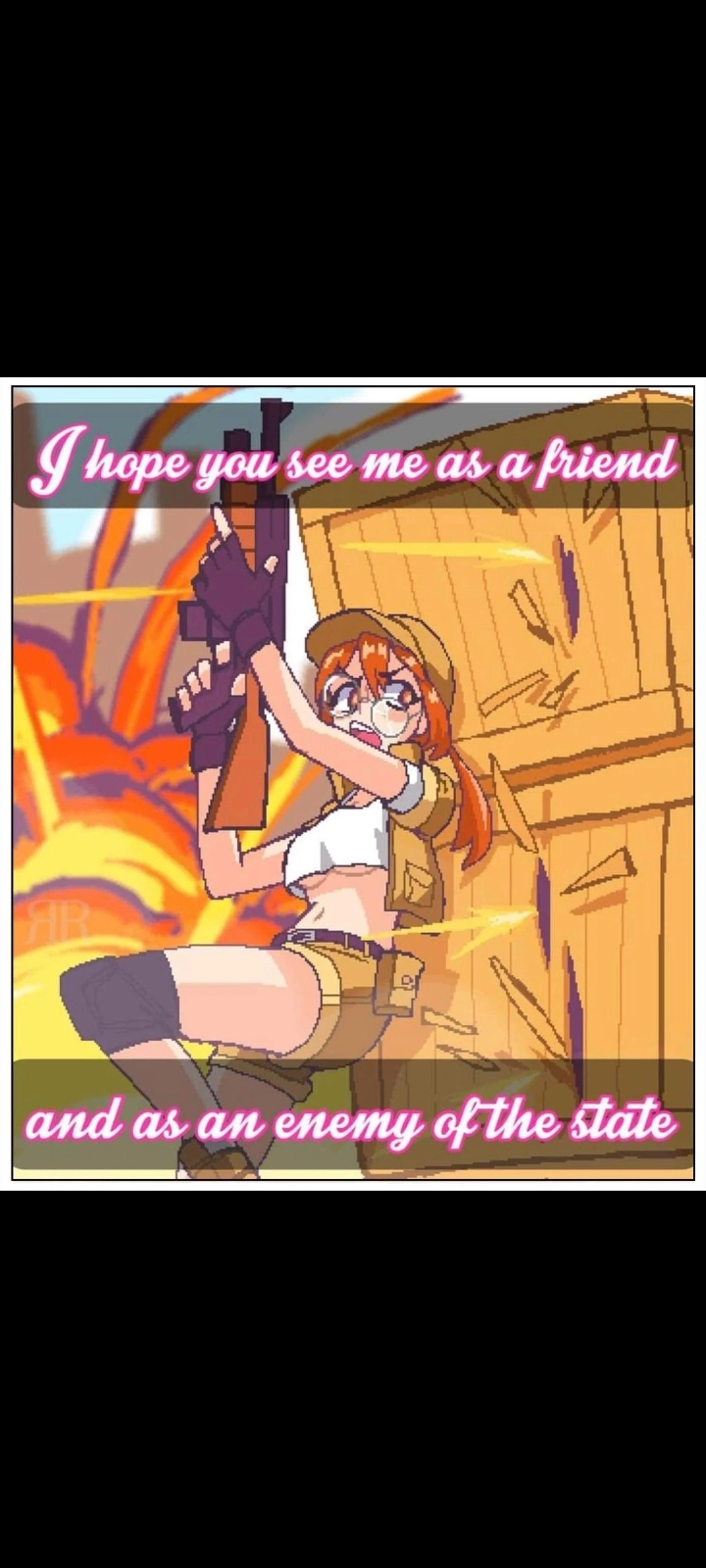Is there a compilation of Putin just dunking on tha yankee? I don't want to have to hear a yankee speaking, if I could, and people truly are hyping up the interview.
Damn that’s kinda awesome. Really shows that he’s very aware of Tuckers game. “I’m going to speak and you’re going to listen, and if you really have any questions go ahead and show the world how fucking stupid you are you wannabe CIA asset.”
Libs in my circles have latched onto a part where he (they claim, I haven't watched it) says the molotov-ribbentrop pact was to protect Czechoslovakia which is pretty brainwormy. I've been responding to ribbentrop shit for the last few days because of the uptick in discussion about it.
Germany and Poland already shared the annexation of parts of Czechoslovakia by then. How would the Molotov-Ribbentrop plan change that?
The plan of the Western powers was for Germany and Poland to invade the USSR, after giving them Czechoslovakia, while Japan enters the war from the east.
The Brits signed the Dusseldorf agreement after Munich (annexation of Sudetenland) to establish industrial cooperation between the British and Nazi Germany, months before Germany invasion of Poland. Clearly they did not expect to declare war on Nazi Germany at all. They all fully expected Hitler to turn east towards the USSR.
Stalin’s diplomats engineered the Molotov-Ribbentrop pact at the last minute (apparently without Hitler’s involvement) to drive a wedge into this plan, forcing Germany to invade Poland, and in turn forcing the British and the French to declare war on Germany.
The entire Japanese cabinet resigned after the Molotov-Ribbentrop pact was signed. Like, seriously, ask yourself, why would the entire Japanese government resign just because two foreign countries signed a neutrality pact?
Question, but how could Hitler to turn east towards the USSR if Poland is in the way? Unless they expected the Poles and Nazis to collaborate? or did they believe he wouldn't invade France and do the USSR next? Is there any evidence of this?
Poland had been collaborating with Nazi Germany.
Granted, the thesis I wrote above came from Said Gafurov’s new book Pledge of Victory, which provided evidence to the compelling argument that the Molotov-Ribbentrop pact was a last-minute act to foil the German-Polish-Japanese offensive against the USSR. I am very slowly going through the book because my Russian is not good and I need a lot of help with translation etc.
However, what gave me confidence is that Losurdo’s Stalin: History and Critique of a Black Legend also gave a very similar treatment of the Molotov-Ribbentrop pact:
Even more disturbing is Poland’s role. As has been observed, Poland became “entirely subordinate to German policy,” beginning with the signing of the ten-year non-aggression pact with Germany on 26 January 1934. The following year Polish Foreign Minister Beck declared to his deputy: “There are two political formations undoubtedly doomed to disappear, Austria and Czechoslovakia.” 23 The consonance with Hitler’s program was clear, and it was not only a matter of words: “the Polish ultimatum to Czechoslovakia demanding the return of Tešin finally convinced Beneš, according to his own account, to abandon any idea of resisting the Munich settlement. Poland had been so far a more useful jackal to Germany in the East than Italy had been in the Mediterranean.” The Munich Conference did not mark the end of the Warsaw government’s collaboration with the Third Reich. “If Hitler was really aspiring to set foot in the Ukraine, he had to go through Poland; in the autumn of 1938, this seemed by no means a political fantasy.” 24 There even seems to be encouragement for this from Warsaw. In January of the following year, during a conversation with Hitler, Beck declared that Poland “does not attach any significance to the so-called security system.” 25
continued:
Stalin had every reason to be concerned or distressed. Before the Munich Conference, the U.S. ambassador to France, William C. Bullit, observed that the important thing was to isolate “Asiatic despotism,” saving “European civilization” from a fratricidal war. After the triumph achieved by Hitler a British diplomat noted in his diary: “Czechoslovakia, from having been a dagger pointed to the heart of Germany, is now rapidly being organized as a dagger into Russian vitals.” 26 At the time of the crisis that resulted in the Munich Conference, the USSR had been the only country to call out the Third Reich and confirm its support for the government in Prague, putting more than seventy army divisions on a state of alert. Subsequently, after the complete dismemberment of Czechoslovakia by the Third Reich in March 1939, Moscow forwarded a harsh note of protest to Berlin.27 The reaction of the other capitals was much more “composed.” And so, the Nazi-fascist aggressors successively devoured Ethiopia, Spain, Czechoslovakia, Albania and China in Asia, thanks to the direct complicity or passivity of the Western powers, who were inclined to direct the further ambitions and expansionist aims of the Third Reich toward the country that had emerged from the October Revolution. To the east the Soviet Union felt the pressure exerted by Japan on those frontiers. The danger of invasion and war was thus arriving on two fronts. It was only at this point that Moscow began to move in the direction of the non-aggression pact with Germany, taking note of the failure of the popular front policy.
Carried out by Stalin with conviction and decisiveness, the popular front policy had cost not a little. It had strengthened the Trotskyist opposition and agitation especially in the colonies. What credibility could there be in an anti-colonialism that spared—so the accusation sounded—the major colonial powers of the time, to concentrate fire on a country, Germany, which at Versailles had lost even the few colonies it had previously possessed? Above all, for colonial peoples themselves it was difficult to accept the turn of events. England had been largely discredited. In the spring of 1919 it had not only been responsible for the Amritsar massacre, which had cost the lives of hundreds of defenseless Indians, but had resorted to “public floggings” and de-humanizing collective punishment and terrible national and racial humiliation, forcing on city dwellers “the humiliation of crawling on all fours to and from one’s home.” 28 Later, as the Second World War flared up, the imperial government repressed pro-independence demonstrations by machine-gunning them from above with the air force (infra, ch. 6, § 4). These were the years when Gandhi stated that “In India we have a Hitlerian government, albeit disguised in milder terms.” And again, “Hitler was ‘Great Britain’s sin.’ Hitler is only an answer to British imperialism.” 29 Indeed, when the war was over, Gandhi would go so far as to pay homage to Subhas Chandra Bose who had fought alongside the Axis for the sake of independence: “Subhas was a great patriot. He laid down his life for the country.”30
In conclusion: it had not been easy for the USSR to get the idea accepted that, despite appearances, even for the people of the colonies the main danger was still constituted by the Nazi-fascist coalition, by the Germany-Japan-Italy axis, and in particular by the Third Reich, which was determined to resume and radicalize the colonial tradition, even resorting to extreme means. For countries like England and France the policy of the popular fronts entailed much lower costs, and yet they sabotaged it. At this point the USSR had no choice but a pact with Germany, a move that has been defined as “a last-minute, dramatic improvisation” to which Moscow resorted in the absence of any other alternative, “on the very eve of a new European war.” 31
This became a turning point that is usually assessed with an eye exclusively on Europe. But there is no reason to ignore the repercussions in Asia. Mao Zedong expressed his satisfaction thus: “The pact represents a blow for Japan and a help for China,” because “it gives the Soviet Union a better chance” of supporting “China in her resistance to Japan.” 32 Precisely for this reason the Japanese government considered Berlin’s behavior to be “treacherous and inexcusable.” 33 In fact, flows of Russian arms and ammunition into China became very substantial.
This all makes sense to me, what I am trying to square is what’s the thinking in Berlin while all this is going on? Why do they make the choices they do? With the benefit of hindsight, why would Hitler ever even consider getting on Britain or France’s bad side? We know Hitler wanted his Lebensraum to the east, it seems like it would be straightforward to just hash that out with the eventual “Allies”?
The best answer I have is, Germany and the US/UK/France ultimately were never on the same page. I think the Allies wanted Germany to invade the USSR, but kind of in the way they want the Ukraine/Russia war in the present to grind on as long as possible. They wanted to use Germany to wear down the USSR. Best case scenario for them is for both Germany and the USSR to essentially destroy each other, so you eventually get two weakened states beholden to western hegemony.
That said, I can’t help but wonder how much the irrationality of fascism comes into play here. And I hate to ascribe irrational motives to anyone, even fascists… I have a hard time with any other explanation for a lot of the diplomatic and foreign policy choices the Nazis made.
Keep in mind the French government was going through a shitload of changes at this time. They collapsed mid-crisis more or less and significant changes occurred. The Germanys couldn't be guaranteed who they would be negotiating with. The British also had internal strife from people like Churchill which made it more difficult at times for Chamberlain to pressure the French.
This is on top of the populations being far and away pro an alliance with the USSR. So Germany can't trust that Britain can fully just control French policy, or at least is not privy to how cucked the French really were to Britain and so worried immensely about the French government's gestures towards the Soviets. Remember things got so far as Romania offering the Soviets their airspace to protect Czechoslovakia. Germany could've been dealing with a real alliance any second now as far as they knew. They picked what is called the phony war over risking that
I assume they misunderstood him in the first place, cause it was not to protect Czechoslovakia, it was in response to the betrayal of the Czechs. There was no protecting them by the time the pact was signed
Yeah I assumed something about that was wrong. I haven't watched it. Maybe worth checking what he did say if they're going to go on about it forever.
I generally don't call it an invasion. The government of poland had fled the country by the time the ussr moved into the east almost entirely unopposed because the country was ungoverned. They moved into an ungoverned territory and saved 2 million jews in the process. Then later they saved the rest of the country. And preserved it, and its culture, under lebensraum both of which would have been deleted like the americans did to the lands they captured.
Yes but he also was willing to do it if France would let them in and/or if Romania would let them use their airspace which Romania agreed to. The problem was Britain and France intentionally stalled this with fake promises of an alliance until Poland decided to help Germany invade Czechoslovakia at which point the west completely capitulated. Chamberlain is honestly less evil somehow than the Polish government
So before World War II, Poland collaborated with Hitler and although it did not yield to Hitler’s demands, it still participated in the partitioning of Czechoslovakia together with Hitler. As the Poles had not given the Danzig Corridor to Germany, and went too far, pushing Hitler to start World War II by attacking them. Why was it Poland against whom the war started on 1 September 1939? Poland turned out to be uncompromising, and Hitler had nothing to do but start implementing his plans with Poland.
Saying that Poland refusing to cede Danzig to Germany was the cause of WW2 is a bit iffy I think. Why is Danzig a legitimate target to cede while the Sudetenland was an outrage?
It would be nice if people were less easily impressed with blood and soil propaganda.
Does anyone else kinda find it annoying that Reddit is mad that Putin was giving a history lesson? I mean I didn't watch the interview (and I won't tbh) but it seems pretty silly to go after him for providing historical context to the region.
There are other reasons to be mad at Putin and tucker, but this wasn't it.
I saw posts about putting explaining the formation of the earth and the big bang on reddit. It's silly.
Settler colonists are trained from birth to advocate that bygones be bygones because that's the only moral framework under which they can even try justify living on stolen land.
Therefore, other people remembering history is a direct threat to the anglo settler colonists and they will react accordingly.
Settler colonists are trained from birth to advocate that bygones be bygones because that's the only moral framework under which they can even try justify living on stolen land.
I never thought of it like that, it makes so much sense why Americans and anglos think that way.
settler colonists are trained from birth to advocate that bygones be bygones
Ugh I immediately thought of how reporters were asking the victims of the Charleston Church Shooting immediately after if they forgave the killer.
I found a YouTube link in your comment. Here are links to the same video on alternative frontends that protect your privacy:
bygones be bygones
This is countered by "debt comes with interest."
it seems pretty silly to go after him for providing historical context to the region.
It is silly, but it's also entirely predictable. Since they (reddit libs) have no concept of the historical context, when it is provided, all their shitty surface-level vibes-based reasoning for supporting NATO and Ukrainian fascists starts crumbling. So of course they're going to get upset at being informed of history. It triggers their cognitive dissonance and makes them look like the fools they are.
Liberals are deathly allergic to context, much like how a vampire is terrified of garlic
this is just harry potter brain with a slightly older version of harry potter
 no its noooooot, harry potter is racist, xenophobic, transphobic, neoliberal propaganda with a terribly constructed world!
no its noooooot, harry potter is racist, xenophobic, transphobic, neoliberal propaganda with a terribly constructed world!Tolkien's work on the other hand is racist, xenophobic, christo-monarchist propaganda with a well constructed world!
... and i kinda like it so you'll find that makes it cool and good 😎
Tolkien as a human outside the book ended up being a good person with good intent, rowling is a fascist with only hate in her heart
Yeah Tolkien felt bad about his characterisation of the Orcs, and despite it clearly having a gentry much of the Shire (Tolkiens ideal society) is appealing to more Agrarian minded Socialists.
And even Aragorn is far from an entirely noble figure, the work is never completely comfortable with an absolute monarch divinely chosen, even a good and non-intervening one.
He's a utopian Catholic basically, sure he wrongly accepts the concept of class collaboration, but that's because he believes (also wrongly) that such a society can be founded on compassion and mutual co operation, resulting in the class differences slowly fading away.
I deeply love LotR but I re-read the trilogy a year ago for the first time as a leftist and as much as I hate to admit it, there’s definitely racism in the book. I don’t think Tolkien was consciously white supremacist or anything, but he was a product of his place and time, and early 20th century England was dripping with chauvinism towards non-white people in that time. He may have felt bad about portraying the orcs as one-dimensional but afaik he never regretted portraying the “evil men” in explicitly orientalist or brown terms.
But I definitely think Tolkien’s socio-political views are wildly contradictory. As much as he seems to love monarchy, afaik he never spoke out in favor of actual monarchs like Elizabeth II having any real power.
Just to be upfront, I'm a huge Tolkienite and have loved Tolkien since I was a little kid before the movies even came out, so I'm biased. And I'm having a rough night so I may not express this as eloquently and I'm not going to find sources at the moment.
But, I don't think Tolkien's work is racist the way people say and I do believe his, let's say, stances are years ahead of Rowling despite the fact that he was born the better part of a century earlier and was raised a White man in apartheid South Africa.
That being said, he isn't perfect or a Communist. And if you take Lord of the Rings as book by itself, then I can see how you would mostly draw that conclusion you mention. That it's racist and treats the White, Western men as the inherently "Good" men who fight the "evil" hordes of Black and Brown men. But, honestly, you get a much fuller picture if you also read other supporting literature, The Silmarillion as well as The History of Middle-earth, and so on, as well as his personal letters. There is a lot of humanizing and sympathy that happens towards the Haradrim and Men of Rhûn that is pretty tight. And even with Orcs, but I won't get into that.
There is a whole history of how the Men of the West, Aragorn's ancestors, not only were made so evil and corrupt by following Sauron themselves that they dared go to war with the fucking gods, which almost brought about their own utter annihilation, but also that they literally colonized, enslaved, pillaged, and murdered the indigenous population. This history of conflict between Men ("humans") caused so much hatred and resentment towards the West that when Sauron eventually came along as their enemy who promised to bring victory over them that the Southrons and Easterlings naturally allied with Sauron. Not because they were inherently evil but because of the material history. This only later developed into cults of worship, but the same Men of the West made Sauron-influenced cults of worship too so that is not unique either. So, Men of the West aren't in any way the inherently good men of the entire story—nor are Elves for that matter, they have a severely fucked history that is not discussed in Lord of the Rings. It just doesn't get brought up as deeply so people just get this Good v. Bad surface level view in that one book, similar to how taken by itself The Hobbit is just a fairytale but is very different when contextualized in its history. And I just see it as Men of the West already having had their own fall to Sauron's evil and now, because of their own actions, this same evil has passed to the Southrons and the Easterlings. The Men of the West are fighting Sauron, but they are not necessarily fighting the other Men—it's not like there is an attempt at genocide after Sauron is defeated. There is an understanding that Sauron is the true evil and manipulating the other Men—again, Sauron also corrupted the Men of the West and other races and they are constantly fighting the temptation to go back to him so it is not like they are totally above these 'evil' men just for not being under Sauron's sway this time. And even in Lord of the Rings itself you already at least see one humanizing moment with Sam when he and Frodo are in Ithilien and one of the Haradrim falls dead off the Mûmakil (Oliphaunt) and Sam wonders
what the man's name was and where he came from; and if he was really evil of heart, or what lies or threats had led him on the long march from his home; and if he would rather have stayed there in peace.
Oh yeah its pretty racist but much less than, say, Orwell and in some ways less than TH Lawrence.
no its noooooot, harry potter is racist, xenophobic, transphobic, neoliberal propaganda with a terribly constructed world!
Tolkien's work on the other hand is racist, xenophobic, christo-monarchist propaganda with a well constructed world!
oh damn I didn't know that
I just meant it along the lines of them both revolving around a bunch of mayos in a meadow with random magical crap happening
I'll explain why you're wrong later. It'd been a long day.i need to make a Tolkien copypasta for myself sometime so I don't have to repeat myself manually every time this weak shit comes up
@America, can you please retrieve your clown from Russia?
Which one? Putin was America's guy, 25 years ago, when Russia was in danger of electing the communist party.
To be fair, he's Russia's clown in America, and he just happened to have a state sponsored vacation in Russia. No one in America wants him either, which is why he has his own thing now.
I would once again like to remind everyone that america doesn't need anyone's help.
You understand Putin called him out as a failed CIA asset for the entire world to see right? What this interview was in my opinion was Tucker APPLYING to be a Russian stooge and hilariously failing because Putin would never hire someone with past and current ties to the CIA.
One theory I heard is that Tucker was auditioning for Trump’s VP pick, which is not a contradiction at all among certain factions of the CIA.
If he had somehow managed to get very positive responses from Putin, he could leverage that to boost his credentials as a “serious candidate” and reinforce Trump’s platform on the Ukraine war. Although I don’t know if Trump’s ego would allow that.
Either way Putin clearly didn’t give him the win he was looking for at all lol.
(I still think the main reason the Republicans are so opposed to the Ukraine war is because they don’t have the money laundering fronts set up in Ukraine like the Democrats do, so they are seething at the Democrats blatantly transferring billions of dollars there and benefiting from it)
I could not agree more with this comment. Beautifully said. My comment was more tongue in cheek, but yeah clearly this dude wants to be someone’s stooge.
I didn't say he was good at being Russia's clown. He's just very pro-Russia for very wrong reasons. He wants to be used by Russia for money. He doesn't care about anything except what he can get for himself. He's just a whore that no one wants but he hopes Russia is willing to pay for.



















